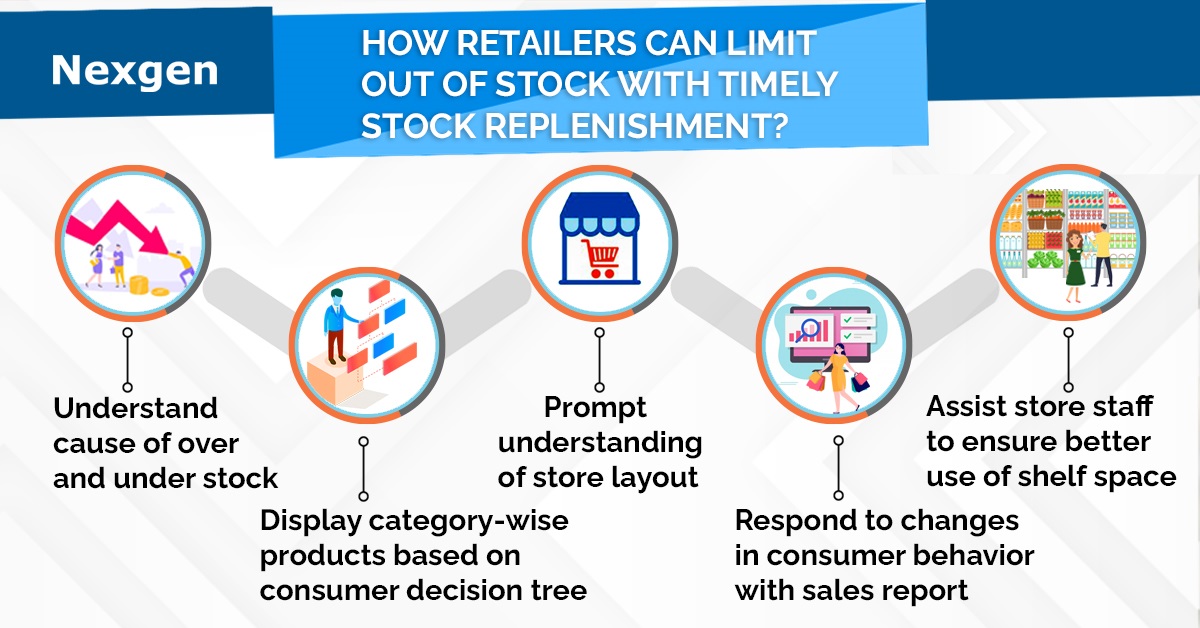What happens if a customer visits your store for a specific product and they could not find the product on shelves? Maybe they will ask the salesperson to check if there is one at the back of the store. It can cause people to have a bad impression and lose their interest in shopping from your store. This happens when you fail to replenish the stock correctly.
What is Stock Replenishment?
Stock replenishment is a vital part of retail sales, and it ensures that the retail shelves are stocked with the right products at the right time with optimum quantity. It is important that the store shelves are stocked with enough products to meet customer's needs and demands. For proper inventory management, retailers should pay attention to two things: overstock and understock. These can together make a retail store lose its sales. Too little stock in the store leads to missing out on sales and customers. Whereas, overstocked goods can cause inventory wastage and results in high carrying costs. Retailers can automate replenishment with the help of planogram software. Planogram would help figure out the over and under stock causes and improve customer experience by ensuring that products are more readily available on retail shelves. Also, a planogram includes proper inventory management, category proportions and management and report analysis with retail data that improves retail sales.
What are Planogram Tips to Limit Out of Stock?
Planogram can assist store staff to ensure better use of shelf space and stock in retail stores. There are chances that constant promotions and ever-changing demand for some items can make the shelves empty, and this prompts customers to visit other stores. In this blog, we will talk about planogram tips to limit your retail out of stock:

- Prompt understanding of store layout: The first tip to limit out of stock is to understand the store’s floor plan. Planograms and floor plans are interconnected. Floor planning aids retailers in calculating the necessary space needed for each category and correct product range required for the store. If the retailer fails to analyze the floor plan, this can lead to over-ordering stock and be over ranging in categories. On the other hand, if the retailer orders a small amount of stock from suppliers, it can make the shelves look empty which leaves a negative impression on customers.
- Ensure right category-wise space allocation: Having the correct space allocated for each category can help sell out products evenly. This can be done with the help of a days of supply feature of planogram software. It helps to ensure that the right products are available at the right time with planograms. While optimizing the days of supply, planogram provide insight about the particular time frame based on customers demand with the data reports. This helps to autofill the shelves at the right time and improves sales.
- Display products based on display hierarchy: Before entering a store, most customers have an idea about the products they wish to buy including brand type, product quality segments, product attribute including size, flavor, type, and packaging. A well-structured consumer decision tree helps customers to shop easily. Also, it allows space planners to identify that allow-demand items, over and under stock issues of the store shelves.
- Build and implement data-driven planograms: Data-driven planograms can help retailers to allocate the store’s shelf space to products with the sales data. This allows retailers to visually display products on shelves to maximize sales and efficiency. Planograms can assist retailers in identifying the products that are in high demand. That is why, data-driven planograms helps to respond to changes in consumer behavior with the sales analysis report, assortment planning and proper shelving. When a retailer implements a data-driven planogram correctly, he can track the sales data of products. This helps to understand fast and slow-moving items in his store and can prevent overstock issues. This also helps to manage the category-wise stock orders and placing the products correctly on store shelves.
Overview of Nexgen POG
Nexgen POG is a cloud-based powerful planogram software for visual merchandising. It provides the retailer with a detailed assortment optimized planogram for better shelf planning. Planogram also helps eliminate retail over and understock on store shelves. It comes with an array of features, including customizable templates, bulk upload images, easy compliance, report generation and much more. Its interface is extremely user-friendly, and planograms can be designed by easily dragging and dropping the products. Nexgen POG is a cost-efficient planogramming tool, designed for creating store-specific planograms.
Get Your Free Trial Now!